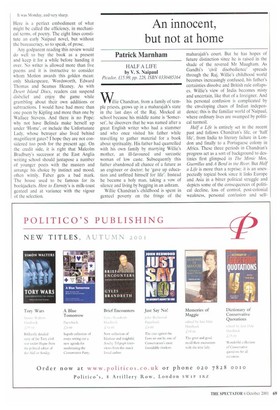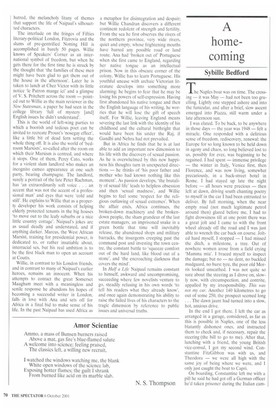An innocent, but not at home
Patrick Marnham
HALF A LIFE by V. S. Naipaul
Picador, £15.99, pp. 228, ISBN 0330485164 Willie Chandran, from a family of temple priests, grows up in a maharajah's state in the last days of the Raj. Mocked at school because his middle name is 'Somerset', he discovers that he was named after a great English writer who had a stammer and who once visited his father while travelling to gather material for a book about spirituality. His father had quarrelled with his own family by marrying Willie's mother, an ill-favoured and sarcastic woman of low caste, Subsequently this father abandoned all chance of a future as an engineer or doctor; he 'gave up education and unfitted himself for life'. Instead he became a holy man. taking a vow of silence and living by begging in an ashram.
Willie Chandran's childhood is spent in genteel poverty on the fringe of the maharajah's court. But he has hopes of future distinction since he is raised in the shade of the revered Mr Maugham. As Gandhi's 'civil disobedience' spreads through the Raj, Willie's childhood world becomes increasingly confused, his father's certainties dissolve and British rule collapses. Willie's view of India becomes misty and uncertain, like that of a foreigner. And his personal confusion is complicated by the enveloping chaos of Indian independence; this is the familiar world of Naipaul, where ordinary lives are swamped by political turmoil.
Half a Life is entirely set in the recent past and follows Chandran's life, or 'half life', from India to literary failure in London and finally to a Portuguese colony in Africa. These three periods in Chandran's progress act as a sort of background to destinies first glimpsed in The Mimic Men, Guerrillas and A Bend in the River, But Half a Life is more than a reprise; it is an unexpectedly topical book since it links Europe and Asia in a bitter political struggle and depicts some of the consequences of political decline, loss of control, post-colonial weakness, personal confusion and self
hatred, the melancholy litany of themes that support the life of Naipaul's silhouetted characters.
The interlude on the fringes of Fifties literary-political London, Fitzrovia and the slums of pre-gentrified Notting Hill is accomplished in barely 50 pages. Willie knows of Speakers' Corner as an international symbol of freedom, but when he gets there for the first time he is struck by the thought that 'the families of these men might have been glad to get them out of the house in the afternoon'. Later he is taken to lunch at Chez Victor with its little notice 'le Patron mange ici' and a glimpse of V. S. Pritchett across the room — pointed out to Willie as the main reviewer in the New Statesman, a paper he had seen in the college library 'full of mystery [and] English issues he didn't understand'.
This is the world of left-wing parties to which a boorish and tedious poet can be invited to recreate Proust's 'nosegay effect'. like a little bit of dead fern setting the whole thing off. It is also the world of 'bedroom Marxists', so-called after the room on which their Marxism is centred, and where it stops. One of them, Percy Cato, works for a violent slum landlord who makes an incognito cameo appearance at one such party, bearing champagne. The landlord, surely a portrait of the late Peter Rachman, has 'an extraordinarily soft voice . . , an accent that was not the accent of a professional man' and eyes that were 'cold and still'. He explains to Willie that as a property developer his work consists of helping elderly protected tenants in the big houses 'to move out to the leafy suburbs or a nice little country cottage'. Naipaul's jokes are as usual deadly and understated, and if anything darker. Marcus, the West African Marxist, training for presidential power, is dedicated to, or rather insatiable about, interracial sex, but his real ambition is to be the first black man to open an account at Coutts.
Willie, in contrast to his London friends, and in contrast to many of Naipaul's earlier heroes, remains an innocent. When his attempts to contact the great Somerset Maugham meet with a meaningless and senile response he abandons his hopes of becoming a successful writer in London, falls in love with Ana and sets off for Africa in a final bid to make sense of his life. In the past Naipaul has used Africa as a metaphor for disintegration and despair; but Willie Chandran discovers a different continent redolent of strength and fertility. From the sea he first observes the rivers of the northern province, very wide rivers, quiet and empty, whose frightening mouths have barred any possible road or land route. Ana had 'broken out of Portuguese when she first came to England, regarding her native tongue as an intellectual prison. Now in this obscure corner of the colony, Willie has to learn Portuguese. His youthful unease with archaic Victorian literature develops into something more alarming; he begins to fear that he may be losing his powers of self-expression. Having first abandoned his native tongue and then the English language of his writing, he worries that he will lose the gift of speech itself. For Willie, leaving England means severing the last link with the identity of his childhood and the cultural birthright that would have been his under the Raj, if Gandhi and Nehru had not prevailed.
But in Africa he finds that he is at last able to add an important new dimension to his life with the discovery of sexual passion. As he is overwhelmed by this new happiness his thoughts turn in unexpected directions — he thinks of 'his poor father and mother who had known nothing like this moment'. As passion develops, 'the brutality of sexual life' leads to helpless obsession and then 'sexual madness', and Willie begins to feel some 'respect for the religious outlawing of sexual extremes'. When the affair ends, Africa continues, the broken-down machinery and the brokendown people, the sham grandeur of the last estate managers, an imprisoned snake in a green bottle that time will inevitably release, the abandoned shops and military barracks, the insurgents creeping past the command post and investing the town centre, the constant battle to 'squeeze comfort Out of the hard land, like blood out of a stone', and 'the encroaching darkness that covers the mind'.
In Half a Life Naipaul remains constant to himself, awkward and uncompromising, succeeding where few novelists venture to go, steadily refusing in his own words 'to tell his readers what they already know', and once again demonstrating his ability to raise the failed lives of his characters to the tragic dimension by reference to public issues and universal truths.



































































































 Previous page
Previous page